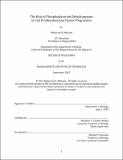The role of phosphoglycerate dehydrogenase in cell proliferation and tumor progression
Author(s)
Mattaini, Katherine R. (Katherine Ruth)
DownloadFull printable version (14.24Mb)
Other Contributors
Massachusetts Institute of Technology. Department of Biology.
Advisor
Matthew G. Vander Heiden.
Terms of use
Metadata
Show full item recordAbstract
The metabolic needs of proliferating cells are distinct from those of quiescent, terminally differentiated cells. Cancer is a disease of inappropriate cell proliferation, and tumor cells require a unique metabolic program to support proliferation. Phosphoglycerate dehydrogenase (PHGDH) catalyzes the first step in the serine biosynthesis pathway, and the gene encoding this enzyme is amplified in human cancer. PHGDH-amplified cells depend on PHGDH expression to proliferate, and upon PHGDH knockdown, supplying exogenous serine cannot restore proliferation. We hypothesized that PHGDH is an unappreciated source of the reductive currency NADPH for biosynthesis and/or redox maintenance. PHGDH can utilize NADP+ as a cofactor in vitro, and tritiated glucose tracing shows that PHGDH produces exclusively NADPH, not NADH, in cells. We therefore designed and validated mutant PHGDH enzymes with altered selectivity for NAD(P) (H) that can be used to test whether an ability of PHGDH to produce NADPH is required for cell proliferation. In the course of these experiments, we found that N-terminally tagged PHGDH exhibits structural alterations compared to the wildtype enzyme and is incapable of supporting proliferation. To enable future studies of a physiologically relevant form of PHGDH, we developed a method to purify untagged recombinant PHGDH. In order to model PHGDH-amplified cancer in vivo, we developed a doxycycline-inducible PHGDH transgenic mouse. When PHGDH expression is increased ubiquitously in mouse tissues, melanin granules are present in hair follicles at an inappropriate stage of the hair follicle cycle. This melanocyte-related abnormality is provocative, as PHGDH amplification occurs in human melanoma. When PHGDH is overexpressed in a model of melanoma driven by mutant Braf and Pten loss, tumor growth is accelerated. Mice with mutant Braf normally develop growth arrested melanocytic nevi, and when PHGDH is overexpressed in this context an increased in nevi is observed and malignant melanoma arises with incomplete penetrance. These data identify PHGDH as the first metabolic enzyme that can be overexpressed in its wild type form and promote cancer initiation and/or progression to a malignant state. We conclude that PHGDH metabolic activity is important for cancer cell proliferation and that PHGDH amplification or overexpression can promote tumorigenesis at multiple stages.
Description
Thesis: Ph. D., Massachusetts Institute of Technology, Department of Biology, 2015. This electronic version was submitted by the student author. The certified thesis is available in the Institute Archives and Special Collections. Cataloged from student-submitted PDF version of thesis. Vita. Includes bibliographical references.
Date issued
2015Department
Massachusetts Institute of Technology. Department of BiologyPublisher
Massachusetts Institute of Technology
Keywords
Biology.